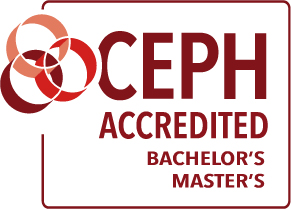Overview
- Degree Level
- Undergraduate
- Degrees Offered
- Bachelor of Science
- Department
- Public Health Department
- school/college
- College of Health Sciences

The Bachelor of Science in Public Health with a concentration in Global Health equips you with the tools necessary to study, research and practice ways to improve health outcomes for communities and populations. Our concentration in global health will allow you to apply these concepts to populations around the world.
A multidisciplinary program focus situates you at the intersections of public health, social science, and innovations in global health practice. These theoretical and practice-oriented underpinnings foster creative, evidence-based action to address the social, economic, and environmental determinants of health through the context of modern challenges and opportunities across societies.
The degree program emphasizes collaboration, critical thinking, and experiential learning. You will develop a unique set of skills with which to address health disparities and improve health and wellbeing in ways that are socially and culturally meaningful to communities in the United States and across the globe, “preparing students for life in a rapidly changing global society” in accordance with the mission and vision of Arcadia University. Additionally, our program offers small class sizes and nationally recognized faculty—all at a low cost.
Students interested in declaring public health as a major should meet with Dr. Reema Persad-Clem to discuss the program.
*The above positions can be in different sectors such as local, state, federal health agencies, the health and wellness industry, nonprofits and academia.
The Minor in Global Public Health provides undergraduates with the opportunity to learn about public health principles from a global perspective. Interested students should meet with their major advisers and with Dr. Reema Persad-Clem for the Global Public Health Minor.
Arcadia University’s Bachelor of Science in Public Health and Master of Public Health programs are accredited by the Council on Education for Public Health (CEPH).

Required Course
You will learn a basic understanding of the epidemiologic method of identifying disease-causing exposures and behavioral factors that place individuals at risk of other health-related events. Study the generation of hypotheses based on descriptive epidemiological data, the testing of hypotheses through analytic epidemiologic research, the determination of causality, and the value of epidemiologic research in developing and evaluating disease prevention strategies. The course will enhance your ability to analyze problems systematically and to think collectively.
Required Course
Explore the critical challenges in global health using multidisciplinary perspectives. Study the issues at the nexus between development and health, including millennium development goals, disease burden, environmental health and safe water, epidemiology and demography of disease, AIDS and HIV prevention, chronic diseases, nutritional challenges, social determinants of global health, harm reduction and behavioral modification, health professionals and capacity development, as well as human rights and bioethical issues in a global context.
Required Course
Synthesize, integrate and apply global public health skills and knowledge in the context of service learning projects. Translate classroom learning into real world global public health practice. Partner with a global health-related agency, program, or initiative to participate in a service learning project. Evaluate global public health principles through service, reflection, dialogue, observation and other approaches.
Elective Course
Explore an intensive philosophical study of social injustices from a variety of contemporary perspectives, including critical liberalism, historical materialism, and the tradition of intersectional theory. Examine issues, including economic exploitation, sexism, racism, colonialism, heteronormativity, transphobia, environmental injustice, and their intersections. Classes incorporate lecture and discussion.
Required Course
You will study health outcomes, determinants of health, and the ways policies can or have influenced population health in the U.S and globally. This course covers a broad perspective, including recognizing a health care systems approach, additional (non-health care related) public health policies, the concept of “Health in all Policies,” and organizational policy. You will briefly review the history of U.S. federal health care system reform and comparative international models (e.g., Canada, UK, Germany), as well as emphasize specific government approaches (at federal, state and local levels) to address health (e.g.,smoking bans), including international perspective.
Elective Course
Examine the lack of affordable homes, urban homelessness and extreme impoverishment from a comparative historical perspective. Cases to be examined will include the United States, United Kingdom, Kenya and India. A third of the class will devote to service learning (volunteering with residents of one of Project HOME’s housing programs).
